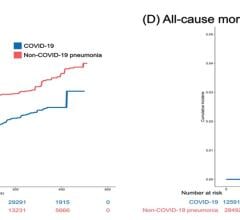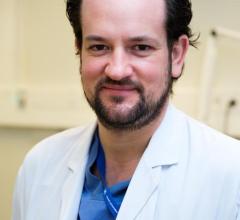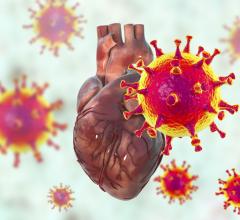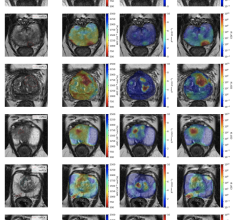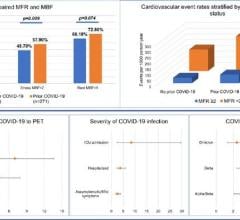
March 31, 2023 — In a study among residents of Ventura County, Calif., rates of sudden cardiac arrest rose sharply during the COVID-19 pandemic.
New data collected and analyzed by investigators in the Smidt Heart Institute at Cedars-Sinai found that residents of Ventura County had a 38% increase of sudden cardiac arrest during the first two years of the COVID-19 pandemic. Most affected were Hispanic residents, who faced a 77% increase of the condition causing a sudden loss of heart function that is usually fatal.
The study, published in the peer-reviewed medical journal Heart Rhythm, also found that overall survival from sudden cardiac arrest declined from 15.3% to 10% during the pandemic.
"While we believe some of the rising cases of sudden cardiac arrest could have been a direct result of COVID-19 infection, we also suspect that indirect effects of the pandemic played a crucial role in the spike of incidence, and in the decline of survival," said Kyndaron Reinier, PhD, MPH, research associate professor in the Department of Cardiology in Smidt Heart Institute and co-senior and co-corresponding author of the study.
The indirect effects, Reinier says, may have included patients delaying preventive care for their heart conditions during the pandemic as well as waiting to call 911 for chest pain or other cardiac-related symptoms. Additionally, bystander CPR declined among all residents, especially Hispanic residents.
"As we look to future waves of COVID-19 or entirely new pandemics, this study emphasizes the importance of seeking preventive--and emergent--care when needed, and providing bystander CPR and education among Ventura residents," said Reinier, associate director for Epidemiology in the Center for Cardiac Arrest Prevention.
Although studies in other communities have reported similar findings, this is the first study to include data from two full years of the pandemic and to evaluate the differences in sudden cardiac arrest rates by ethnicity.
Key findings:
- The incidence of sudden cardiac arrest rose 38% during the pandemic, from 39 cases per 100,000 individuals to 54 cases per 100,000 individuals.
- The incidence increased the most among Hispanic residents, who experienced a 77% increase overall; non-Hispanics experienced a 25% increase.
- During the pandemic, 44.6% of Hispanic residents experiencing sudden cardiac arrest were given bystander CPR, compared with 54.7% of non-Hispanics.
- While incidence of sudden cardiac arrest rose markedly during some COVID-19 surges, it was higher throughout the entire two-year period, even during non-surge times.
The data comes from the longstanding Prediction of Sudden Death in Multiethnic Communities (PRESTO) study based in Ventura, which is led by study co-senior author Sumeet Chugh, MD, director of the Center for Cardiac Arrest Prevention in the Smidt Heart Institute.
The ongoing study is a unique collaborative effort with Ventura County residents, the Ventura County Health Care Agency, all first responders, the medical examiner and the hospital systems that deliver care within the community.
"These real-world findings that span the COVID-19 pandemic have uncovered important ethnicity-specific challenges that could be addressed to help the community, especially in the event of future outbreaks," said Chugh, the Pauline and Harold Price Chair in Cardiac Electrophysiology Research. "The ultimate goal with this study, as well as the work underway in the Center for Cardiac Arrest Prevention, is to deploy community-based interventions that will prevent sudden cardiac death."
For more information: www.cedars-sinai.org
Related Content on New Technology and Ideas to Address Health Disparities:
VIDEO: New Ideas in Addressing Cardiovascular Disease Disparities — Clyde Yancy, M.D
VIDEO: How Smartphones May Revolutionize Healthcare in the Developing World —Interview with Jacques Kpodonu, M.D.
VIDEO: Reducing Hypertension Among African-Americans — Interview with Kim Allan Williams, Sr., M.D.
VIDEO: New PLATINUM Diversity Data Shows Early DAPT Cessation OK in Minorities With New Generation Stent — Interview with Roxana Mehran, M.D., where she explains how trials can be designed to better include minorities.
VIDEO: Use of Wearable Medical Devices for Cardiac Rehabilitation — Interview with Robert Klempfner, M.D.
VIDEO: Use of Wearables to Track Electrophysiology Patients — Interview with Khaldoun Tarakji, M.D.
COVID-19 Cardiovascular Registry Details Disparities Among Hospitalized Patients
Study Finds Removing Cost from Calcium Score Testing Increased Utilization
Blacks Have Higher Mortality After PCI
Link Shown Between Economic Disparities and Cardiovascular Death in Middle-Aged Adults

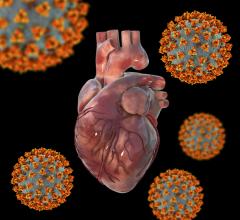
 March 20, 2024
March 20, 2024 

